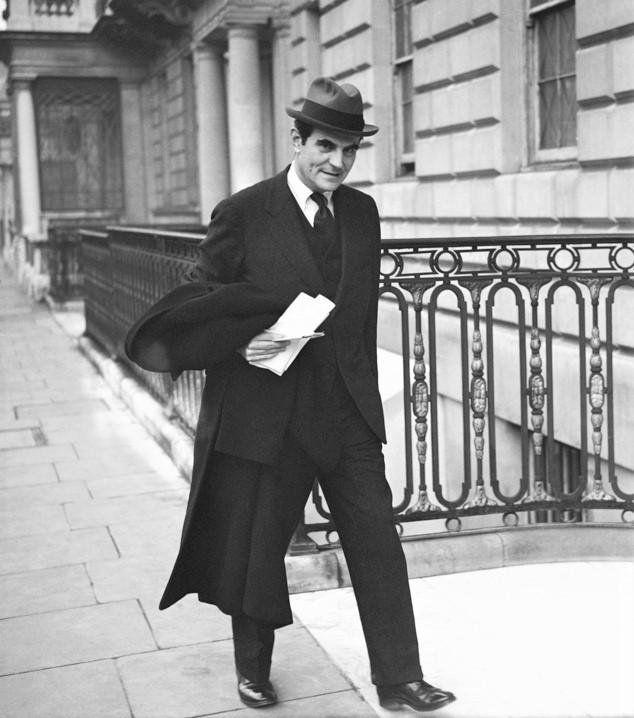
FILE – In this December 8, 1944 file photo, U.S. Ambassador to Britain John Winant arrives at the Embassy in London as Japan declares war. Years after his death a group from New Hampshire is raising money for a memorial on honor of Winant. (AP Photo/File)
Sometimes, those who have contributed mightily to their country slip below history’s radar. John Gilbert Winant was one of them.
After serving two terms as the Republican Governor of New Hampshire, Democratic President Franklin Roosevelt tapped Winant to be the first head of the Social Security Board. While Republican colleagues called him “a Republican New Dealer,” Winant’s work so impressed Roosevelt that he appointed him ambassador to Britain in 1941. On the day of his appointment, Winant said, “When the war has been won by democracy, we must be prepared to conquer the peace.”
Along with broadcast journalist Edward R. Murrow and American Envoy Averell Harriman, Winant worked tirelessly in urging Roosevelt to enter the war before the will and resources of England were exhausted.
Winant was dining with Prime Minister Winston Churchill at his country estate at Chequers when Churchill asked his butler to bring the radio to the table. Listening to the BBC, the evening’s music was interrupted by the announcement of Japan’s attack on Pearl Harbor. In her engaging book, Citizens of London: The Americans Who Stood with Britain in Its Darkest, Finest Hour, historian Lynne Olson describes the scene.
“Churchill was on his feet and heading toward the door, exclaiming, ‘We shall declare war on Japan!’
“Throwing his napkin on the table, Winant jumped up and ran after him. ‘Good God, you can’t declare war on a radio announcement!”
“Churchill stopped and, looking at him quizzically, asked, ‘What shall I do?’ ”
“I will call up the President by telephone,” Winant said, “and ask him what the facts are.”
After Roosevelt confirmed the information, the president added, “We are all in the same boat now.”
“That night,” Olson writes, “[Churchill] wrote [that] he ‘slept the sleep of the saved and thankful,’ quite convinced now that ‘we had won the war. England would live.”
Olson describes how Winant not only personally helped British citizens in the streets of London during the Blitz but gave speeches that would rally them to action. One notable example took place in 1942 when Britain was facing a coal strike. Winant received a call from Labor Party Leader Clement Attlee requesting the American ambassador’s help to resolve the crisis.
“Winant didn’t need Attlee to tell him how perilous a prolonged coal strike would be for Britain,” Olson writes. “Coal was the life’s blood of British industry, and its production, in the words of one historian, ‘was every bit as essential to Britain’s victory as going on the battlefield.’”
On June 6, 1942, the American ambassador’s speech rallied the miners with words that extended beyond the immediate crisis of war.
“You who suffered so deeply in the long Depression years,” Winant told the miners, “Know we must move on a great social offensive if we are to win the war completely. It is not a short-term military job. We must solemnly resolve that in our future order we will not tolerate the economic evils which breed poverty and war. This is not something that we shelve for the duration. It is part of the war.
“What we want is not complicated,” Winant said. “We have enough technical knowledge and organizing ability… We have enough courage. We must put it to use. When war is done, the drive for tanks must become a drive for houses. The drive for food to prevent the enemy from starving us must become a drive for food to satisfy the needs of all people in all countries. The drive for manpower in war must become a drive for employment to make freedom from want a living reality… Just as the peoples of democracy are united in a common objective today, so we are committed to a common objective tomorrow. We are committed to the establishment of the people’s democracy.
“We must always remember,” Winant added, “that it is the things of the spirit that in the end prevail. That caring counts. That where there is no vision, people perish. That hope and faith count, and that without charity there can be nothing good. That by daring to live dangerously, we are learning to live generously. And that by believing in the inherent goodness of man, we may meet the call of your great Prime Minister and ‘stride forward into the unknown with growing confidence.’
“The following day, Britain’s Daily Express carried the headline: ‘WINANT TALKS, STRIKE ENDS.'”
In 1947, John Gilbert Winant was only the second (and last) American citizen, after General Dwight Eisenhower, to be made an honorary member of the British Order of Merit.
After the war, Winant returned to his home in Concord, New Hampshire. His work and a broken relationship with Churchill’s youngest daughter, Sarah, tragically took their toll pushing him into a deep depression that ended with him taking his own life.
Less than a month earlier, Winant had delivered a speech at the opening session of the 16th annual forum. Discussing “America’s Problems of Liberty,” he not only focused on the issues the country faced at that time but foreshadowed the cloud that hangs over the country today.
In that speech, The New York Times writes, “He stressed the need of keeping a people’s democracy strong in the United States as a ‘protection against danger from both within and without. The purpose of national policy, he said, should be to bring about world political and social conditions in which free institutions could exist.’”
Throughout his life, Winant placed principles above politics always looking for what government could do to help others. Roosevelt called Winant a “liberal Republican.”
We need more such principled men and women, Republican and Democrat.
Comments










